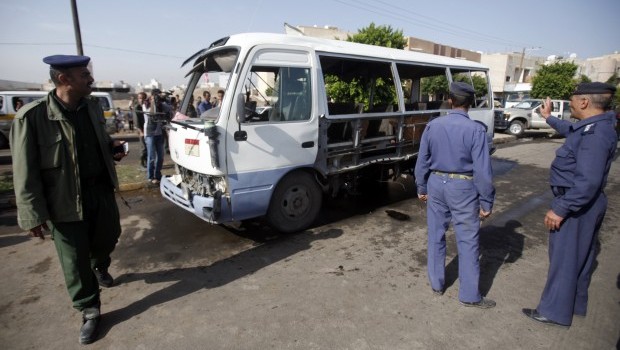
A policeman (L) and air force officers gather at the site of a bomb attack on a military bus in Sana’a on August 25, 2013. (REUTERS/Khaled Abdullah)
“This cowardly terrorist act resulted in the martyrdom of one person and injured a number of others, several of whom are in a serious condition. They have all been transferred to hospital,” an air force spokesman told the local SADA news agency.
It was not initially clear who was behind the attack, which is confirmed to have claimed the life of one Yemeni serviceman, Sgt. Mohammed Al-Shaghdar.
The military personnel were being transported to a nearby air force base when the device was detonated, sending the passengers’ bodies into the streets, eyewitnesses said.
The attack came after a presidential committee reached a ceasefire agreement on Saturday between Houthi and Salafist groups in the Saada governorate, north of the capital.
Sheikh Yahya Mansour Abu Isba’a, a member of the presidential committee and assistant secretary-general of the Yemeni Socialist Party, told Asharq Al-Awsat that the cease-fire agreement “came into force [Friday] evening, and is valid until the moment that skirmishes start appearing here and there, or when parties no longer want the solution.”
Sunday’s explosion does not constitute such a breach of the agreement. The ceasefire—put into effect at a Salafist institute in Dammaj that was founded by the late Sheikh Muqbil bin Hadi Al-Wadi’i—does not cover the capital.
“We will continue our efforts in spite of difficulties. . . . We hope to overcome these difficulties and stop the bloodshed, which have lasted a long time in this region and this governorate,” Abu Isba’a continued.
Meanwhile, Yemeni president Abed Rabbo Mansour Hadi held talks with the head of the US military’s Central Command, Gen. Lloyd Austin. The two discussed bilateral cooperation in the fight against terrorism and Al-Qaeda, coinciding with an intensified use of unmanned aircraft by the US in a number of Yemeni governorates.
Earlier in the week, Hadi requested an increased use of drone strikes as part of his government’s attempts to pursue Al-Qaeda elements.
“We will pursue them until they seek peace, give up their weapons and return to their senses as Yemeni citizens and not as enemies of Yemen, and kick out the foreigners who carry out these military attacks with them,” Hadi said on Thursday.
Yemeni sources told Asharq Al-Awsat that Hadi had met with a senior US military delegation to discuss “the nature of various situations in Yemen, including security, political and economic aspects,” as well as “what remains of the crisis that erupted in early 2011, and the serious repercussions on various levels.”
The United States—along with Britain, France and Germany—decided to close its diplomatic mission in Yemen and 19 other Middle Eastern countries earlier in the month, after a worldwide alert claiming that Al-Qaeda was planning attacks in the Middle East and North Africa.
The diplomatic mission in Sana’a opened last Sunday, two weeks after the decision to close its doors.
